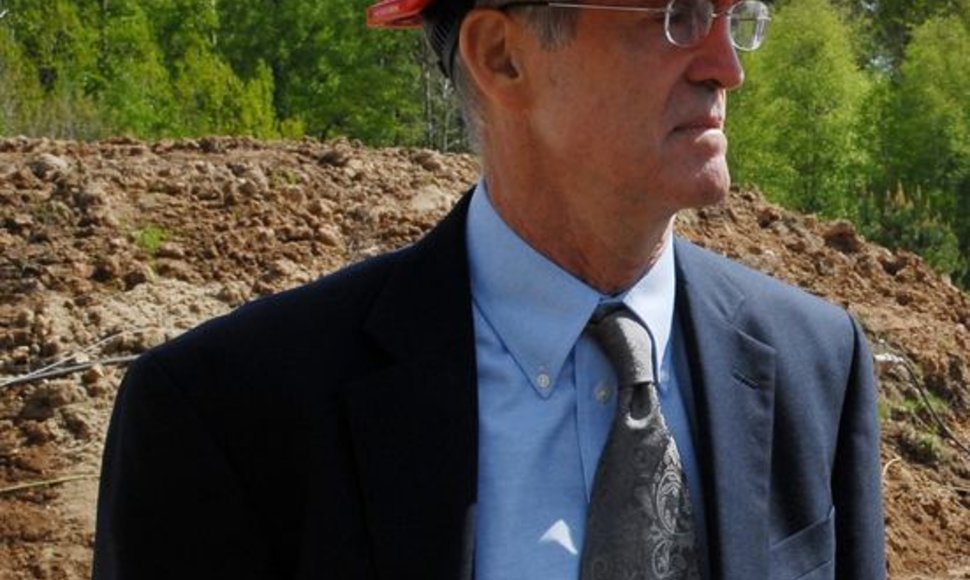Haselton is also one of the richest and most mysterious people in Lithuania. The oil company he leads is one of the biggest tax payers in the country, but his own public persona is inconspicuous to say the least.
Several years ago, Haselton and his partners bought LL Investicijos, a company that was almost dead but held a license to explore for oil in promising areas, and talked Chevron into investing in it. With one foot already in the market, the Americans soon decided to set up one more company, Chevron Lietuva, and bid for shale gas exploration license.
In an interview to 15min, Haselton, CEO of Minijos Nafta, a leading oil producer in Lithuania, talks about the backstage of the “black gold” industry, about how he managed to get Chevron to come, and what stands in the way of strategic energy projects.
– You've accumulated a wealth of experience in the Lithuanian oil industry, yet your keep a very low profile. Could you give a short dossier of yourself?
– I am a Lithuanian citizen. I've lived here for 15 years. Minijos Nafta, the company I run, has contributed about 150 million euros in tax to the state budget. There aren't many people in Lithuania who could say that. I am the largest shareholder in the Danish company called Odin Energy. The company owns half of Minijos Nafta. The other half is owned by Poland's Lotos.
When I came here, there was hardly any oil business. The technology was from a hundred years ago. Almost everyone involved was taking money under the table. We completely transformed the oil industry. We introduced modern techniques – 3D sizement, horizontal drilling, fracking. We introduced the concept of having competitive bidders. We got rid of all this insider dealing that was going on. We ran an open honest company that was very profitable.
– You also brought Chevron to Lithuania. How did you manage to do that?
– The entire country suffered from shady dealings in the oil industry. From the very start, we fought for it to be a transparent and honest business. When Chevron showed interest, we saw it as the best possible thing for the country. It is an affluent company with state-of-the-art technology that extracts oil and shale gas all over the world.
Shale gas has completely transformed the international gas market. Profits are generated not just by gas extraction but in related businesses. This creates many new jobs. It is estimated that shale gas accounts for 5 percent of jobs in the US.
– Why do you think Chevron's coming to Lithuania was met with so much resistance?
– People think that foreign investors will appropriate Lithuania's resources. That is not true. The company that will look for shale gas and oil is half-Lithuanian. Chevron is ready to invest its own money so we can find out the prospects of shale gas and oil production in Lithuania. If the results are promising, this means great money not just for Chevron, but Lithuania as well.
It has so far been assumed that Lithuania has more shale oil than gas. Should at least some of the estimates prove correct, Lithuania-based oil companies could become second-biggest tax payers in the country. For that to happen, it would suffice to extract 30 thousand barrels of oil per day. It is not much – at one point, Minijos Nafta would produce about 10 thousand barrels per day without incurring any damage to the environment. It would secure huge financial benefits for Lithuania and its people, yet not everyone realizes that.
Great many lies, half-truths, and innuendos are being spread. Much information in the press have no relation to reality whatsoever. People watch movies financed by obscure structures. Makers of such movies are not motivated to save the world. They simply want to make money for themselves. Information presented in these movies can be refuted with scientific research, yet no one cares. Even filmmakers themselves admit they have concocted facts.
– Scouting for oil goes back many years in Lithuania, but people are scared of new shale gas and oil exploration technologies. For example, horizontal drilling or chemicals used in the process. People have a right to demand that things be explained to them?
– Horizontal drilling, how can that have any effect on the surface? We are talking here about processes 2 kilometres underground. We have been doing that in Lithuania for 15 years. It is standard oilfield technology. Horizontal drilling has nothing to do with pollution. It is a completely safe technology used for many years. Minijos Nafta drills almost all of its wells like this.
People object to chemicals because they think it's poisonous. But poisonous is a relative thing. It depends on concentration.
I used to be a navy diver. Water can kill you if you drink too much. If you breath pure oxygen under pressure, it is poisonous. Finally, carbon dioxide that comes out of your mouth is poisonous. Lithuanian and EU laws are very strict about the use of potentially poisonous chemicals, so the concentrations used in fracking is far under the allowed limit.
– Will the Lithuanian public and institutions be informed about the chemicals to be used?
– In the US, they withheld information about chemical composition used in fracking as commercial secret. I think that was a mistake.
In Europe, it is different. We made public a full list of chemicals we use. Some of them are used in food industry. Sure, if you drink a glass of it, you'll get sick. But the concentration in shale gas fracking is so low, it is silly to talk about any real danger.
– Another commonly raised issue – the quantity of water needed for fracking.
– They say that Lithuania will be short on water once we start extracting shale gas. That is absurd. True, the process requires water, but Lithuania is not a country that is short on water supply. Water could be a problem in Texas. But here? One well uses the amount of water it takes to fill two average swimming pools.
– LL Investicijos took out a licence to explore oilfields six years ago. Why so long a wait to start actual work?
– When the company was issued a licence to look for oil, no one knew about shale. Company owners did not have adequate financial resources or competence. They made one unsuccessful drilling.
Three years ago, I assembled a group of investors and they bought out the company's shares. I saw potential for investment. Today, the company is run by different people than when it was founded. We know what we're doing. We brought in Chevros, the company with advanced technology and required experience. It's a huge step forward.
– Would Chevron bear responsibility in case of an accident?
– Chevron owns half of LL Investicijos. Our company is insured with a huge sum of money. It is Chevron that pays our insurance fees. In case there's an accident of any sort, insurance will cover damages. The company has sufficient financial resources to carry on with its operations, so local people and the state can rest assured. The coming of Chevron allows us to take care of all the issues pertaining to safety.
– Are you certain you'll find oil or gas in Lithuania?
– There's a chance we won't find anything in Lithuania. We know that there is oil, since we're working with it. We do not know how much. If there's too little, Chevron will walk away. But would it be bad? Lithuania will have used Chevron's money to obtain helpful and expensive information. If the experiment fails, it will be a loss for Chevron, not Lithuania.
During research, most of the investment will go to Lithuanian companies and the state. For instance, primary preparation costs us 23 million litas – and it will be paid to Lithuanian companies. One of them is the state-run Detonas, it will perform detonation for seismic tests. It will create about 50 jobs.
– What are the benefits to be expected by the local community and business?
– For example, we had to prepare a site for a drill we did six months ago. We hired a local construction company. We had to hire cranes and special equipment to transport and install drilling technology.
When we find oil, we sign transportation contracts to ship it to a refinery. Minijos Nafta has no obligation to improve road infrastructure, yet several years ago, our roads repair budget was greater than that of entire Klaipėda County. We also do a lot of social spending – building community centers, helping people in other ways. We do not have to, but we do what we think is right. We started meeting people who live in the territory to be explored. We asked them what they needed, what made them concerned.
– And yet, not everyone is willing to let you in on their land?
– Some communities do talk to us. Some shout and do not want to listen. We've been in this business for a long time, so we were surprised by the reaction and by how well coordinated this resistance was. That's not just a bunch of farmers protesting against shale gas.
It is a well- organized and well-financed campaign directed against the coming of Chevron. In my view, the ones who benefit from it are the people selling gas at high prices and reluctant to be superseded. It's Russia.
The same people who protested Visaginas Nuclear Power Plant now stand behind the protesters here. They succeeded. It must be the time to get rid of Chevron now. People believe that all green activists fight to keep the environment clean. But that's not always the case. Oftentimes, their goal is to make money. This happens in other countries, too. Say, in France, shale gas fracking is banned, but that is probably to defend interests of nuclear energy companies.
– But one could understand why someone would not wish to have holes drilled all over his or her land. When it comes to one's own backyard, there's little inclination to consider national interests.
– People say they want peace and quiet. Should we stop building hospitals and schools? That, too, makes noise and inconveniences people. In the US, people own land as well as what's underneath it. They are only too happy to make money and let oil companies rent their land to drill. I think that local inhabitants, too, should get direct financial benefit from oil wells. Such is the case in Poland.
– Shale gas opponents are supported by some prominent politicians. What do you make of that?
– Politicians succumb to pressure in their quest for popularity. How else could we regard their statements that contracts signed with local people about starting exploration are invalid?
The same contacts have been used by all oil companies for fifty years. People signed the same contracts before starting seismic tests for a gas storage facility.
Lithuania has drafted an energy independence strategy, specifying strategic directions to be taken. People must be familiar with the strategy and politicians must work in concert for one common goal. It is unnatural that some politicians should work in the opposite way and obstruct energy independence.













